
Introduction to US Clinical Experience for IMGs
As an international medical student, gaining clinical experience in the United States is a crucial step towards a successful medical career. US Clinical Experience (USCE) not only enhances your medical knowledge and skills but also provides a unique opportunity to familiarize yourself with the US healthcare system. In this comprehensive guide, we will explore the different types of US clinical experience available for IMGs and discuss their importance in shaping your medical career.
Importance of US Clinical Experience for International Medical Students
The importance of the US Clinical Experience for international medical students cannot be overstated. It offers a chance to observe and learn from experienced healthcare professionals in a diverse and advanced medical environment. By immersing yourself in the US healthcare system, you will gain a deep understanding of the practices, procedures, and cultural nuances that are vital for delivering quality patient care.
Furthermore, USCE provides an opportunity to build strong professional networks, which can be invaluable for future job prospects and recommendation letters. It demonstrates your commitment to pursuing a medical career in the United States and showcases your ability to adapt to new environments and work with a diverse patient population. Ultimately, US Clinical Experience can significantly enhance your residency application and increase your chances of securing a coveted spot in a US-based program. Clinical rotations in USA have a significant role for medical students.
Types of US Clinical Experience for IMGs
There are two types of US Clinical Experience available for IMGs, each offering unique benefits and opportunities. Let's explore some of the most common options:
- Hands-on Clinical Experience
- Non-hands on Clinical Experience
Hands on Clinical Experience for IMGs:
Hands on clinical experience is the most valuable type of experience. It includes everything we've talked about before, and the most crucial part is interacting with patients. Depending on whether you're a student or a graduate, you can get this experience through Clinical Electives, Clerkships, Sub-internships, or Externships. Hands on clinical experience programs are designed specifically for IMGs seeking extensive patient interaction. These programs often involve direct patient care and allow you to actively participate in medical procedures, examinations, and treatments. It provides a unique opportunity to enhance your clinical skills, patient communication, and cultural competency.
- Clinical Elective
A clinical elective is like a special training that a medical student can do during their final year, and it doesn't have to be at their own hospital. You can do it in your own country or any other country in the world. But if you want to apply for a residency in the USA, it's best to do your elective in a US hospital. Electives usually last for about 4 weeks, but they can be shorter or longer. Just remember that there's another kind of elective called a Research elective, where you don't work with patients, and it's not considered the same as clinical experience for the USMLE. Clinical electives for international medical students are kind of a training.
- Clerkship
A clerkship is like a mandatory student training that's part of your school's program. It happens at a hospital connected to your school. In the USA, American medical students do these clerkships in their third year, but for most international medical students, it's part of both their third and fourth years. Clerkships and electives are pretty much the same when it comes to the clinical experience you get, so some places might call them the same thing.
- Sub-internship
A sub-internship is the best kind of experience a person can have for their medical career. It's similar to an elective but with more responsibility. You also get to be on-call with your medical team, even at night. Sub-internships are great because you get lots of time with your team and the doctors you're learning from. You can learn a lot and show that you're really dedicated to your medical career. These are especially helpful if you want to specialize in surgery.
- Externship
An externship is a rare type of experience that can be helpful for your medical career. It's considered hands on and better than an observership. Usually, to do an externship, you need to be ECFMG Certified, which is important for postgraduate training with patient contact. Externships aren't as common as other types of experience, and not many hospitals offer them. Some hospitals used to but don't anymore, and only a few still do, depending on who you know. Sometimes they pay you, but they're not for academic credit, so they're not as valuable as other experiences.
Non-hands on Clinical Experience
Non-hands on USCE experiences include observerships, where there's limited or no patient contact. Some people might also consider clinical research as another form of non-hands on USCE.
- Observership
In reality, observerships are often seen as a less respected option for graduates to add some USCE to their resume when other options are limited. The main downside is the limited or no patient contact. However, observerships are easier to find, more likely to be accepted, and have less demanding application requirements compared to other options.
- Research Elective
A research elective is an opportunity for medical students to engage in research at a prestigious university, earning academic credit. It's distinct from a clinical elective and doesn't count as USCE. Having both research and clinical elective experiences on your application can make it more impressive compared to someone with only research elective experience. H
owever, research alone cannot fully substitute for USCE unless it's conducted over an extended period, leads to publications, and helps you build strong professional contacts.
What's generally recognized as USCE includes:
- Externships
- Clerkships (Clinical rotations in the US or Canada)
- Sub-internships (Sub-I)
What's usually not classified as USCE consists of:
- Observerships/Shadowing
- Volunteer Experiences
- Research Experiences
- Experiences in comparable medical settings (like England)
Clinical Clerkship Meaning and Benefits for IMGs
A clinical clerkship is an essential component of the US Clinical Experience for IMGs. It refers to a period of supervised training in a specific medical speciality. Participating in a clinical clerkship allows you to gain practical experience in a controlled and structured environment. Also, Clinical electives for international medical students are kind of a training. It provides numerous benefits, including:
1. Exposure to Different Medical Specialties:
Clinical clerkships expose you to a variety of medical specialities, allowing you to explore different areas of interest. This exposure helps you make informed decisions about your future career path and provides a broader perspective on the medical field. Also, Clinical electives for international medical students are kind of a training.
2. Skill Development and Practical Experience:
During clinical clerkships, you will have the opportunity to apply theoretical knowledge to real-life patient scenarios. This hands on experience enhances your clinical skills, critical thinking abilities, and problem-solving capabilities.
3. Networking and Mentorship Opportunities:
Clinical clerkships offer a chance to build professional relationships with attending physicians, residents, and other healthcare professionals. These connections can provide mentorship, guidance, and potential recommendation letters for future endeavors.
Core Clerkships for IMGs
Core clerkships are a subset of clinical clerkships that focus on essential medical specialities. Clinical rotations in USA have a significant role for medical students.These core rotations cover areas such as Internal Medicine, Pediatrics, Surgery, Obstetrics and Gynecology, Family Medicine, and Psychiatry. Core clerkships provide a solid foundation in these key specialities and are highly valued by residency programs.
Tips for Obtaining US Clinical Experience
Obtaining US Clinical Experience can be a competitive process, but with the right approach, you can increase your chances of success. Clinical rotations in USA have a significant role for medical students.Here are some tips for securing USCE:
1. Research and Planning:
Thoroughly research the programs and institutions offering USCE. Consider factors such as reputation, location, curriculum, and the specialties offered. Plan your application timeline well in advance to ensure you meet all deadlines.
2. Networking:
Build strong professional networks by attending medical conferences, workshops, and events. Connect with physicians, residents, and other healthcare professionals who can offer guidance and potential opportunities for USCE.
3. Preparing a Strong Application:
Craft a compelling application that highlights your academic achievements, clinical experience, and motivation for pursuing USCE. Tailor your application materials to each institution or program to demonstrate your genuine interest.
How to Find and Apply for US Clinical Experience
Finding and applying for US Clinical Experience can seem daunting, but with the right resources and approach, it becomes more manageable. Here are some steps to guide you:
1. Research Online Resources:
Explore online platforms that connect IMGs with USCE programs. ECFMG's Exchange Visitor Sponsorship Program offer comprehensive databases of available opportunities.
2. Contact Medical Institutions and Programs:
Reach out to medical institutions and programs directly to inquire about their USCE offerings. Introduce yourself, express your interest, and request further information about application requirements and deadlines.
3. Seek Guidance from Academic Advisors and Alumni:
Consult with your academic advisors and alumni who have successfully completed USCE. They can provide valuable insights, advice, and recommendations based on their own experiences.
United States Clinical Experience: A Step Towards Success
Clinical rotations in USA have a significant role for medical students. Gaining US Clinical Experience as an IMG is a significant step towards success in your medical career. It not only enhances your clinical skills and knowledge but also demonstrates your commitment to pursuing a career in the United States. By immersing yourself in the US healthcare system, you gain invaluable insights, build professional networks, and increase your chances of securing a residency position.
Clinical rotations in usa for international students is very important. In this highly competitive field, USCE can make a significant difference in your residency application. Clinical electives for international medical students are very important and play a vitol role in the matching process. It showcases your adaptability, cultural awareness, and ability to thrive in a diverse medical environment. So, take the leap and unlock the doors to success by embarking on your US Clinical Experience journey.
Conclusion
US Clinical Experience for IMGs plays a vital role in shaping a successful medical career. The various types of USCE, such as clinical electives, rotations, and hands on experience, offer unique opportunities for international medical students to gain practical skills, exposure to different specialities, and build professional networks. By understanding the importance of clinical clerkships and core rotations, as well as following tips for obtaining USCE, IMGs can increase their chances of success. So, start exploring the world of US Clinical Experience and unlock the doors to a successful medical career today.



